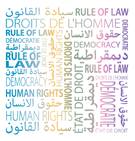Strengthening democratic reform in the southern Neighbourhood
The “Arab Spring” revealed the full relevance of a Council of Europe’s policy towards its neighbours, since developments in Tunisia and other countries of the region raised the fundamental issues of the respect of human rights, the rule of law and democracy, which lie at the heart of the Council of Europe’s mandate. It is in this context that several countries of the Southern neighbourhood have manifested their interest in strengthening co-operation with the Council of Europe, by identifying priority lines of co-operation.
These initiatives have reinforced the need for a review of existing Council of Europe relations and policies with its neighbours – and for the definition of clear strategic priorities about how these relations should develop in the future.
Both the Council of Europe and the European Union share the same objective, namely to promote democratic values and principles, as well as the respect for human dignity in the region. They are both resolved to actively accompanying the democratic changes in these countries, through a concerted approach and in synergy with other actors in the region. For a number of years already, the Council of Europe has worked with countries from North Africa and the Middle East now in the sway of the Arab Spring in a number of specific fields.
A 4.8 million € programme funded by the European Union and implemented by the Council of Europe, entitled "Strengthening democratic reform in the southern Neighbourhood" (South Programme) covered 2012-2014. It is continued through the joint program "Towards strengthened democratic governance in the Southern Mediterranean", also funded by the European Union (€ 7.4 million) and implemented by the Council of Europe.
The South Programme I
Launched in January 2012, this 3-year programme aimed to accompany democratic and political reforms in the Southern Mediterranean countries, following a demand driven and targeted approach. The Programme focused on four specific objectives:
1. To enhance efficiency and independence of the judiciary by improving Courts' performance and by facilitating judicial reform, using as a reference relevant Council of Europe standards.
2. To promote good governance through increased prevention of corruption and money laundering on the basis of the relevant Council of Europe standards, mechanisms and instruments, and to improve the basic framework for regional co-operation.
3. To strengthen and protect human rights, in particular through the prevention and control of trafficking in human beings in line with the provisions of the Council of Europe Convention on Action Against Trafficking in Human Beings and other international standards.
4. To promote democratic values in the region, building on Council of Europe existing networks such as those developed by the North-South Centre, the Youth Department, the Pompidou Group, the Venice Commission, the Schools of Political Studies and the Parliamentary Assembly of the Council of Europe.
The areas of co-operation with the countries in the Southern neighbourhood were decided in accordance with the specific needs expressed by each country, with reference to shared values of human rights, the rule of law and democracy. Activities were implemented over the period 2012- 2014 throughout the region.
South Programme II: the new
website
A new website covering the activities of the South Programme II
(2015-2017) has been launched. For more information on the activities of the
South Programme II, please visit:
http://southprogramme2-eu.coe.int


The Programme
Components
Related links
- CoE and the Arab Spring
- CoE / EU Joint Programmes
- EU Delegation Morocco (Fr)
- EU Delegation Tunisia (Fr)
- EU Delegation Jordan
- EU Delegation to CoE
- EU and the Arab Spring
- EU Neighbourhood Policy
- EU Euro Mediterranean Partnership
- EU Regional co-operation with the Mediterranean partners
- EU Neighbourhood Infocentre
Documents
- CoE-Policy towards its immediate neighbourhood
- CoE-NCP Morocco: EN- FR- AR
- CoE-NCP Tunisia: EN-FR-AR
- CoE-NCP Jordan: EN-AR
- EU-A partnership for democracy and shared prosperity with the southern Mediterranean